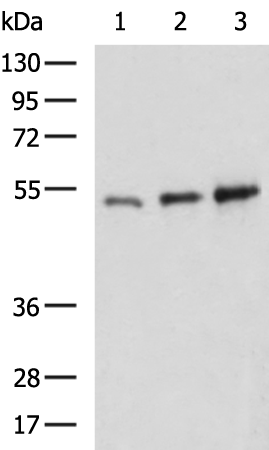
| WB | 咨询技术 | SARS-CoV-2/2019-nCoV、Virus |
| IF | 咨询技术 | SARS-CoV-2/2019-nCoV、Virus |
| IHC | 咨询技术 | SARS-CoV-2/2019-nCoV、Virus |
| ICC | 技术咨询 | SARS-CoV-2/2019-nCoV、Virus |
| FCM | 咨询技术 | SARS-CoV-2/2019-nCoV、Virus |
| Elisa | 1/5000-1/10000 | SARS-CoV-2/2019-nCoV、Virus |
| Aliases | COVID-19; 2019-nCoV; SARS-CoV-2; Nucleocapsid protein; Nucleoprotein; 新型冠状病毒; 新冠病毒 |
| WB Predicted band size | 46 kDa |
| Host/Isotype | Rabbit IgG |
| Antibody Type | Primary antibody |
| Storage | Store at 4°C short term. Aliquot and store at -20°C long term. Avoid freeze/thaw cycles. |
| Species Reactivity | SARS-CoV-2/2019-nCoV、Virus |
| Immunogen | Fusion protein corresponding to a region derived from 1-419 amino acids of SARS-CoV-2 N |
| Formulation | Purified antibody in PBS with 0.05% sodium azide and 50% glycerol. |
+ +
以下是关于SARS-CoV-2 N抗体的3篇代表性文献摘要概括:
---
1. **文献名称**: *Serology assays to manage COVID-19*
**作者**: Krammer, F. et al.
**摘要**: 比较多种商业血清学检测试剂盒的性能,发现针对N蛋白抗体的检测在感染后2-3周敏感度达90%以上,但部分试剂盒存在交叉反应性(如与普通冠状病毒)。研究强调了N抗体作为感染标志物的价值。
---
2. **文献名称**: *Anti-Nucleocapsid Antibody Kinetics Following SARS-CoV-2 Infection*
**作者**: Dispinseri, S. et al.
**摘要**: 追踪感染者6个月的抗体动态,发现N抗体IgG在感染后3个月达峰值,随后缓慢下降,而IgM在8周后显著降低。研究提示N抗体可用于区分近期与远期感染。
---
3. **文献名称**: *Antibody Status and Incidence of SARS-CoV-2 Infection in Health Care Workers*
**作者**: Lumley, S. F. et al.
**摘要**: 比较自然感染与疫苗接种者发现,自然感染诱导的N抗体可持续6个月以上,而mRNA疫苗主要产生S蛋白抗体。研究支持通过检测N抗体区分疫苗免疫与自然感染。
---
4. **文献名称**: *Impact of SARS-CoV-2 Variants on Antigen Detection*
**作者**: Lauring, A. S. et al.
**摘要**: 评估变异株对N蛋白抗体检测的影响,发现Alpha、Delta等变异未显著降低检测灵敏度,但Omicron的N蛋白突变可能导致部分试剂盒假阴性风险增加。
---
**注**:以上内容基于2020-2022年发表的代表性研究综合概括,具体文献可通过PubMed/Google Scholar检索标题获取全文。
**Background of SARS-CoV-2 N Antibody**
The SARS-CoV-2 nucleocapsid (N) protein is a structural protein critical for viral RNA packaging and replication. During infection, the N protein is highly expressed, making it a primary target for the host immune response. Antibodies against the N protein (anti-N antibodies) emerge as part of the adaptive immune response, typically detectable 1–3 weeks post-infection. Unlike antibodies targeting the spike (S) protein, anti-N antibodies are not neutralizing but serve as key markers for diagnosing prior SARS-CoV-2 exposure, especially in serology assays.
N antibody detection is widely used in seroprevalence studies to estimate past infections, complementing molecular tests (e.g., PCR). IgG anti-N antibodies often persist for months, though their longevity varies among individuals. Notably, most COVID-19 vaccines (e.g., mRNA vaccines) induce antibodies against the S protein but not the N protein, allowing differentiation between vaccine-induced and infection-induced immunity. However, this distinction has blurred with the emergence of hybrid immunity (vaccination plus infection) and updated vaccines incorporating N protein targets in some cases.
Studies suggest N protein mutations are less frequent compared to the S protein, making N-based assays relatively stable across variants. Nevertheless, certain variants (e.g., Omicron sublineages) harbor N protein mutations that may affect antibody binding, underscoring the need for ongoing surveillance. Beyond diagnostics, research explores N antibodies' role in disease progression, immune modulation, and potential therapeutic applications, though their clinical utility remains secondary to neutralizing S antibodies.
Overall, N antibodies remain vital tools for understanding infection dynamics, immunity breadth, and viral evolution.
×